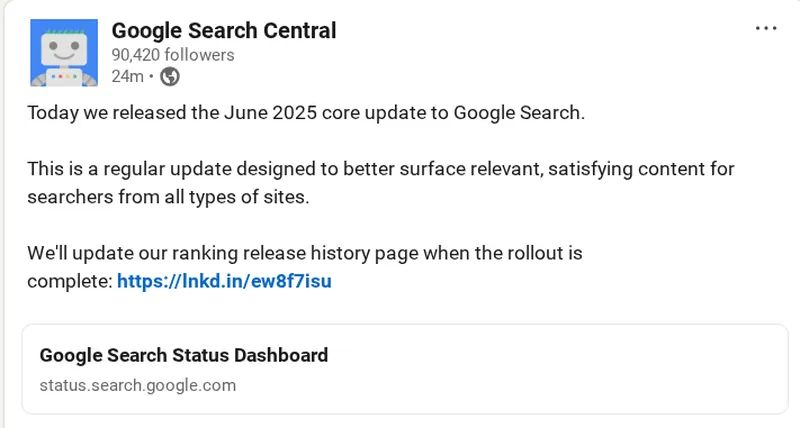As I write this, the June 2025 core update is rolling out. I highly suspect that this update will implement a new advancement Google has made in search called MUVERA.
Update Aug 5, 2025: Google's Gary Illyes said he could not confirm MUVERA was being used in Search but that "we might have something like it." I still think it is worthwhile studying MUVERA as it's quite likely techniques like this are helping to improve Google Search.
MUVERA helps Google do multi-vector search as quickly as single-vector search. Single-vector search is fast, but sometimes misses details. Multi-vector retrieval keeps a small vector for every token on a page, which is more precise, but far too slow. MUVERA bridges this gap.
I think there are big implications for search. And I’m excited about them!

Here’s is Google’s blog post on MUVERA:
MUVERA: Making multi-vector retrieval as fast as single-vector search.
Understanding MUVERA
Before MUVERA, Google did something called single-vector search across the top results retrieved by traditional information retrieval methods. Now they can do multi-vector search thanks to MUVERA. Multi-vector search helps Google find more precise matches, zeroing in on the exact passages, sentences or even individual words that answer a searcher’s question.
I found this difficult to wrap my head around and spent quite a bit of time reading and conversing with Gemini and ChatGPT o3 to help me understand what is happening here.
Single-vector search vs multi-vector search
With single-vector search Google can look at a webpage and condense its understanding of it into a list of numbers, a vector. This vector represents one point in an embedding space. The embedding space is a giant multidimensional map of the content on the web. Pages that discuss similar concepts will exist close to each other in this space. When a search query is embedded into this space, pages that are near to it are likely to be relevant.
Multi-vector search represents each data point not as a single embedding, but a set of embeddings. This allows search to retrieve more relevant documents. However, the mathematical calculations needed to compare a query across many embeddings instead of just a single one are extensive! Until now, multi-vector search could not be used in a Google search system that needs to return results quickly and with minimal cost.
To make it really simple:
Single-vector search is lightning fast, but can miss details.
Multi-vector search keeps a separate mini-vector for each token (a character, word or sometimes a phrase) in a document so it’s much more precise, but far too heavy to run in real time.
MUVERA makes fast multi-vector search possible
Google figured out how to squeeze the multiple vectors from a page into a single vector. They call it “fixed dimensional encoding” (FDE). This means that they can now do the same type of fast search they did with single-vector search across those FDEs. And amazingly, the searches tend to be almost as accurate as if they had done traditional multi-vector searches.
My prediction for how the June 2025 Core update will change search
Core updates happen when Google makes significant changes in their ranking systems. It seems lately that core updates tend to align with advancements in Google's AI capabilities. I think it’s quite likely that the June 2025 core update will introduce our first taste of MUVERA.
The March 2024 Core update happened two weeks following Google's announcement of Gemini 1.5. Gemini 1.5 greatly improved the efficiency of Google's machine learning systems as well as how much data they could use in calculations.
The August 2024 Core update happened a few weeks after Google announced improvements to Gemini 1.5 Flash which made it possible to use Gemini much faster and cheaper.
The December 2024 Core update happened the day after Google's announcement of Gemini 2.0.
The March 2025 Core update happened two weeks before Google publicly launched Gemini 2.5.
So what about the June 2025 update that was released today? Perhaps we will hear of a new version of Gemini soon. But I think what's more likely is that the changes introduced to Google’s core ranking systems involve MUVERA.
Google open sourced the code for MUVERA. It is tempting to play with it. However, I am somewhat changing my stance on optimizing for vector search. If you have not read it yet, I'd encourage you to read this:
Could optimizing for vector search do more harm than good?
I think it's good to understand how vector search works. I also think that by understanding the questions your audience has and answering them in a way that is easy to find and parse is a good thing to do. But, I think that if you use tools to make content that looks really good to vector search, and users don't confirm that greatness, you could teach Google's systems to downplay their assessments of relevance for your site.
My advice is the same as it has been for years. Understand your audience. Do well to answer the questions that they truly have. And create resources that people would consider the most helpful of their kind when compared to other choices they have.
I also think MUVERA will make it easier for Google to surface truly original research and insight.
Did you notice how Google used slightly different wording in their brief explanation of this current core update? They generally tell us core updates are designed to better surface relevant and satisfying content. But this time, they added, “from all types of sites.”

If I am correct in my prediction, we will likely see more content from smaller sites surfacing, and possibly less from well known brands.
We will see!
Marie
If you liked this, you'll love my newsletter!
Related Articles
Could optimizing for vector search do more harm than good?
How Google determines relevancy and helpfulness
SEO in the Gemini Era: The story of how AI Changed Google Search



Comments are closed.